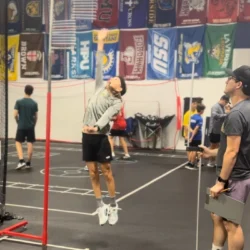Positive affirmations link to improved sports performance
By: Regan Ward and Rogel Lima
Positive affirmations can be defined as present tense, empowering statements that athletes use to build the mindset of a champion. These affirmations will change the way the athlete feels about situations by forming new pathway connections within the neuroplasticity of the brain, thus rewiring the subconscious mind. When positive rewiring occurs, the brain can turn a harmful negative thought pattern into a more positive and productive thought pattern.
In order for this to work effectively, affirmations need to be a part of their daily routine and must reflect the athlete’s specific areas of the sport they wish to improve by focusing on what they CAN do, and not what they cannot do. They also need to be realistic and aligning with the athlete’s values and goals. Affirmations can be long or short statements, are typically in the first person personal pronouns, such as “I” or “me” and are easy to remember.
Examples of positive sports affirmations:
- I am a champion.
- I always give my best performance, on the field and while practicing.
- I embrace challenges as opportunities to improve my game.
- I perform my best under any circumstances.
- I believe in myself and my potential to achieve greatness in my sport.
Positive affirmations have been shown to lower an athlete’s stress level, improve self confidence, overcome self sabotage, and decrease worry, fear, and anxiety. According to Kristin Neff, PhD, an associate professor of education psychology at the University of Texas at Austin and a self-compassion researcher, “ positive affirmations are like going into battle and having your own back as an ally—rather than being an enemy to yourself.”
Where are ideal places to say your positive affirmations?
References
-
- Baltzell, A., & Akhtar, V. L. (2014). Mindfulness meditation training for sport intervention: Impact of MMTS with division I female athletes. The Journal of Happiness & Well-Being, 2(2), 160-173. https://mindfulness4u.org/wp-content/themes/wbgxt77mjxrd20qcb0vp5129109/files/frontend/articles/pdf/v02i02/6.pdf
- Neff, K. D. & Germer, C. K (2018). The Mindful Self-Compassion workbook: A proven
way to accept yourself, find inner strength, and thrive.New York: Guilford Press. - Santos-Rosa FJ, Montero-Carretero C, Gómez-Landero LA, Torregrossa M, Cervelló E.
Positive and negative spontaneous self-talk and performance in gymnastics: The role of contextual, personal and situational factors. PLoS One. 2022 Mar 24;17(3):e0265809. doi: 10.1371/journal.pone.0265809. PMID: 35325003; PMCID: PMC8947089.



